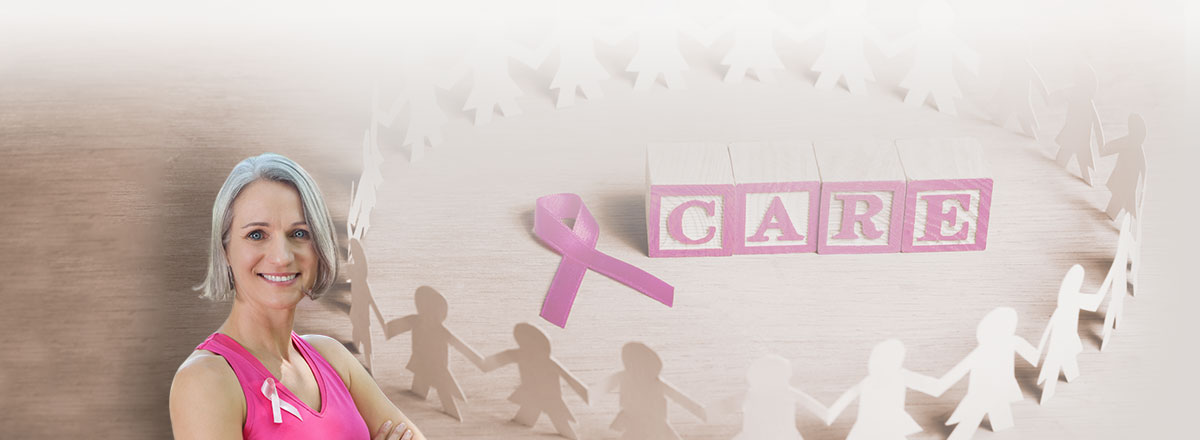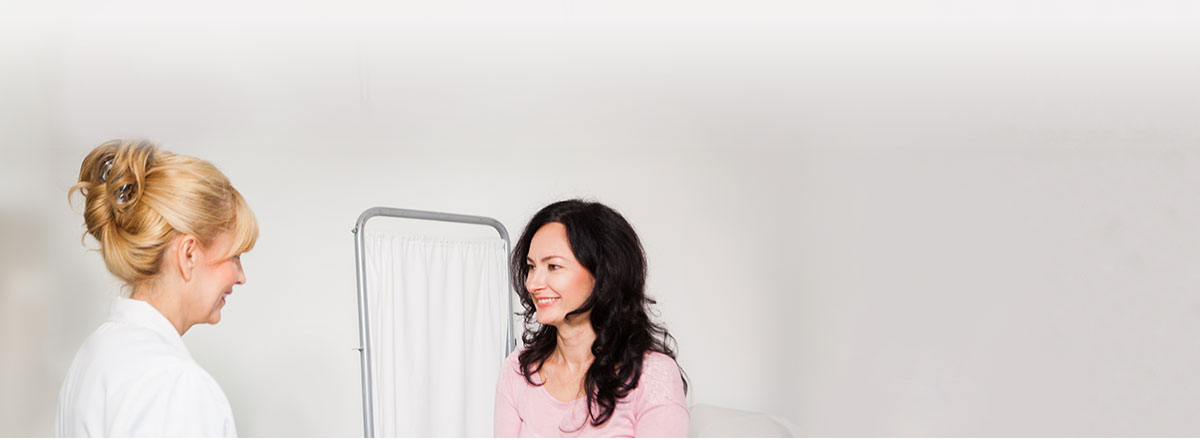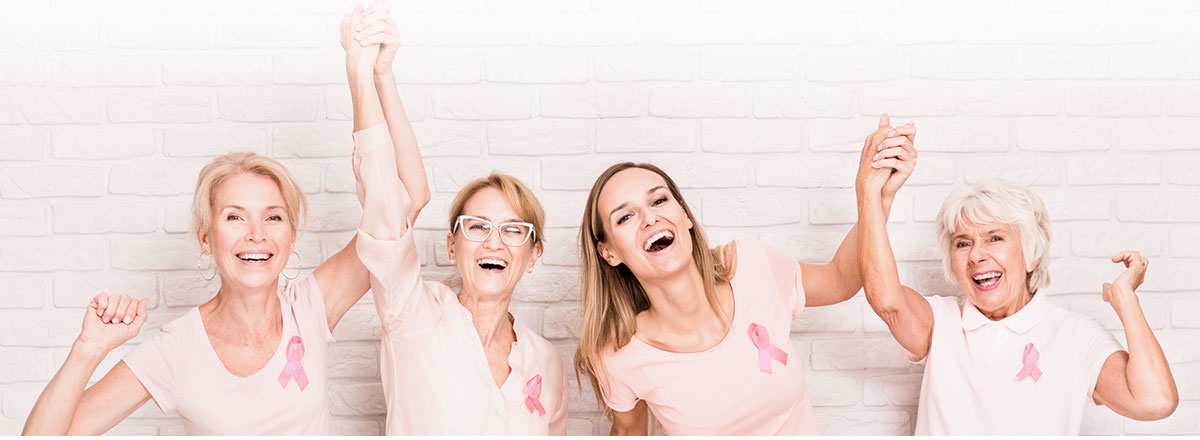Breast Cancer Risk Factors
How Common Is Breast Cancer
Breast cancer is common, affecting 1 in 9 Australian women by the age of 85. Most – 95% - of breast cancers are not related to family history. Only about 5% of breast cancers are thought to be truly related to strong family history.
Breast Cancer and Family History
In this 5%, breast cancer develops because of an inherited gene fault (gene mutation). These gene faults can be passed through men and women in families, from one generation to the next.
Any female family member who inherits this gene fault is at an increased risk of developing breast cancer. Other family history factors to take into consideration are:
- Several relatives with breast or ovarian cancer
- Breast cancer before the age of 40
- Ashkenazi Jewish ancestry
High-Risk Breast Cancer in Women
Less than 1% of women are considered to be high-risk.
A patient may be considered at high risk of developing breast cancer or other cancers if they:
- Have other rare genetic mutations
- Family history of breast cancer
- Have had a prior Breast Cancer or ovarian cancer
If a patient has tested positive for the BRCA1 or BRCA2 gene mutation, they have a lifetime risk of breast cancer between 40% to 85%.
Screening Tests for Breast Cancer
Screening for breast cancer is well established. Screening tests aim to pick up cancer before it causes symptoms.
It is known that survival from breast cancer is highest when it is picked up at this early stage. Screening tests for breast cancer may include:
- Mammograms; these have been proven to find breast cancer at an early stage and to improve survival in the general population. This has not yet been proven in young, high-risk women.
- Breast ultrasound; this is sometimes used as a screening test but is most useful as an additional test when there is a concern after a clinical examination or mammogram. It has not been proven to be a reliable screening test for breast cancer by itself.
- Breast MRI; this is another test that is used to screen women under the age of 50 at high risk of breast cancer. Research has shown that MRI can pick up breast cancer at a very early stage.
- Self Checks; Checking your own breasts for lumps and visiting your doctor each year for a breast examination are other ways to find breast cancer, although these checks do not always lead to earlier diagnosis and improved survival.
How to Reduce Breast Cancer Risks?
There are several things that can lower your risk of developing breast cancer.
Breast Cancer risk can be reduced to a level equal to or even lower than that of the average woman who does not carry a gene fault. Things that can reduce the risk of breast cancer are:
- Surgery to remove the breasts
- Surgery to remove the ovaries and fallopian tubes
- Medication that may reduce the risk of breast cancer
These are very personal decisions. Being aware of the options may make it easier to know what is right for you.
Surgery To Reduce Risks of Breast Cancer
Surgery to remove the breasts dramatically reduces the risk of breast cancer (by about 95%). It is impossible for a surgeon to remove every breast tissue cell, so there is still a possibility of developing breast cancer, but the risk is extremely small. There are different operations that a surgeon can perform to remove the breasts. Reconstruction can be offered to nearly all women after mastectomy.
Every woman reacts differently to the idea of risk-reducing surgery. It is a big decision to have your breasts removed to reduce the risk of cancer. Some women who carry a genetic predisposition:
- Have seen lots of women in the family die of breast or ovarian cancer and feel they would like to do whatever they can to minimise their own risk,
- Others feel that the thought of losing their breasts is worse than the thought of developing cancer. These women may prefer to take medication to reduce the risk of cancer or to have close monitoring.
- Still, others find a combination of both approaches suitable, for example, having surgery to remove their ovaries and fallopian tubes, but close monitoring (without surgery) of their breasts.
All of these approaches are perfectly reasonable. It is important that you make a decision you feel comfortable with.
Remember, you can take all the time you need to get information and consider the choices available to you. You may reconsider and have the surgery in a few years if it doesn’t feel right for you now.
Medication to Reduce Breast Cancer Risks
There are some medications that have been proven to reduce the risk of breast cancer in women who are at higher risk. It is not known whether a similar lowering of risk occurs in women with a BRCA1 or BRCA2 gene mutation
- Tamoxifen is often used to treat breast cancer, but it may also play a role in breast cancer prevention. A five-year course of tamoxifen tablets can reduce the risk of developing breast cancer by half. However, tamoxifen can have some serious side effects, such as causing blood clots in the legs or lungs, and cancer of the lining of the womb (endometrial cancer).
- Raloxifene is a similar medication to tamoxifen and it is approved for breast cancer risk reduction in postmenopausal women. Raloxifene can reduce the risk of breast cancer by around 60% and it has the advantage of also reducing the risk of osteoporosis or natural bone thinning.
Lifestyle Factors Affecting Breast Cancer
There are some lifestyle and environmental factors that can alter your risk of breast cancer and ovarian cancer. These include:
- Alcohol; Even moderate alcohol consumption has been shown to increase the risk of breast cancer. There is some research showing that this also applies to high-risk women. This is one of the lifestyle changes that women can choose to make in order to reduce their risk of breast cancer. If you choose to drink, it is recommended that you limit your intake to one standard drink a day.
- Reproductive factors; Having babies, particularly under the age of 30, slightly reduces the risk of breast cancer in the general population. The effect in women at higher risk is uncertain because results of any research have not been consistent.
- Breastfeeding; Breastfeeding reduces the risk of breast cancer in the general population and in women who carry a gene fault.
- Weight; Obesity increases the risk of breast cancer in the general population, and this is likely to be the same in gene mutation carriers. Keeping your weight in the healthy range (using diet and exercise) is something practical you can do to reduce your risk of breast cancer. It can also reduce the risk of other medical problems like heart disease and diabetes.
- Smoking; It is important for your general health not to smoke.
Personal Factors:
* = Mild increase ** = Moderate *** = Severely increased risk
- Increased risk with
- Age > 50yrs,
- BMI >25 (*)
- Decreased Risk:
- Giving birth before the age of 30 (**),
- Regular exercise (*), Breastfeeding (*)
Lifestyle Factors:
- Increased risk with
- >2 alcoholic drinks/day (*)
Past Medical History:
- Increased risk with
- radiotherapy for Hodgkin's Disease (**)
Family History:
- Increased risk with
- 3 or more first or second-degree relatives diagnosed with breast or ovarian cancer, especially if under the age of 50 when diagnosed (***)
- if from Ashkenazi Jewish descent (***)
- Positive family history for BRCA 1 or 2 mutation (***)
Personal Breast History:
- Increased risk with
- Previously being diagnosed with Atypical ductal hyperplasia (**)
- Ductal Carcinoma in situ (***)
- Lobular Carcinoma in situ (***)
- Dense Breasts on a mammogram (*)
7 Hormones:
- Increased risk with
- Early menarche (before the age of 12) (*)
- Late menopause (after 55) (*)
- Have taken HRT (*)









